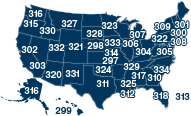Guide to the Hatch Act:
Restrictions on Political Activities
for Mail Handlers and Other Postal Employees
With the 2014 mid-term Congressional elections approaching, all NPMHU representatives must remain cognizant of the restrictions on political activities that are imposed by the Hatch Act. Thanks to changes that were first enacted in 1993, postal and federal employees are allowed to participate in a wide range of political activities. Some activities remain off limits, however, and it is important to review the rules to make sure you remain within the law as you begin each campaign season. The following list should help you remember which activities are within your legal limits and which are not.
If you have any questions, you can call the Legislative and Political Department at the NPMHU National Office or you can call 1-800-85-HATCH for more information.
PERMITTED
- Register and vote as you choose
- Assist in voter registration drives
- Contribute to political campaigns and organizations
- Volunteer on or manage a partisan campaign
- Recruit volunteers for a political campaign
- Raise money for the Mail Handler PAC from other NPMHU members and their families
- Display bumper stickers, lawn signs, and other campaign signs
- Attend a political fundraiser
- Run as a candidate for office in a non-partisan election
- Volunteer, hold an office, or participate in local and state political parties
- Express your opinions about candidates and issues
- Sign petitions
- Participate in political rallies and meetings
- Make campaign speeches for a candidate in a partisan election
- Campaign for or against referendum questions, constitutional amendments, or municipal ordinances
PROHIBITED
- Run for office in a partisan election
- Raise money for a candidate in a partisan election
- Host a fundraiser at your home
- Solicit political contributions in a speech
- Solicit or receive political contributions or volunteer services from a subordinate employee (unless you are members of the same labor organization)
- Engage in political activities while on duty, in a postal facility or in a postal vehicle, or while wearing an official uniform, postal badge or other postal clothing
- Wear political buttons on duty
- Coerce employees to make a contribution to a campaign
- Participate in non-Mail Handler PAC phone bank solicitations for political contributions
- Allow your name to be used on an invitation or mailing for fundraising purposes
- Display partisan posters on federal or postal premises
- Use your official title to influence or interfere with an election
- Solicit or discourage the political activities of any person with business before the Postal Service
One particularly sensitive area that has come under recent scrutiny is the use of e-mail or internet communications, especially while at work. For example, one federal employee was suspended for forty days without pay because he distributed – while on duty in a federal office building – a partisan political e-mail to his co-workers, encouraging them to attend an event at which a candidate for office would be speaking. If you use electronic communications, even for permitted political activities, please be certain that you are doing so from home or another personal computer, and that you do not encourage others to forward your communication while at work in a postal facility.
In another recent case that has received a lot of publicity; a USPS employee was found to violate the Hatch Act by running as a candidate for election to a partisan political office on two separate occasions and knowingly soliciting political contributions through his website and on Facebook. Based upon these facts, the Office of Special Counsel, an administrative law judge, and the Merit Systems Protection Board (MSPB or Board) all agreed that the employee should be removed from employment, notwithstanding the recent passage of the Hatch Act Modernization Act of 2012. Pursuant to this Modernization Act, removal is no longer the presumptive penalty for a violation, but rather “[a]n employee who violates [the Hatch Act] shall be subject to removal, reduction in grade, debarment from Federal employment for a period not to exceed 5 years, suspension, reprimand, or an assessment of a civil penalty not to exceed $1,000.” The MSPB concluded, however, that although the Board should now consider a “broader range of penalties” when determining the appropriate penalty for an employee’s violation, and the Board must now independently determine the proper penalty from among a range of permissible penalties, a flagrant and conspicuous and substantial violation still warrants removal from federal or postal service.
You also should be aware that the Office of Special Counsel, the agency of the federal government that is charged with investigating cases of improper political activities by federal and postal employees, has adopted some very extreme positions, especially with regard to the use of blogs and social networking sites. Blogging about politics at work clearly is prohibited, but even blogging during off-duty hours while at home could be a problem, according to the Special Counsel. This is because many campaign-related websites or blogs contain buttons or links seeking donations to the campaign, and the prohibition on seeking partisan campaign contributions is applicable at home or at work. The only exception is that you may solicit contributions for a partisan political campaign from NPMHU members and their immediate family while off the clock, if you are not on postal or union property, and are not using postal or union facilities. You may, however, use union facilities and union resources to solicit money for the NPMHU PAC, which is nonpartisan.
So when exercising your political rights during the 2014 campaign season, please do so fully, but with caution.
